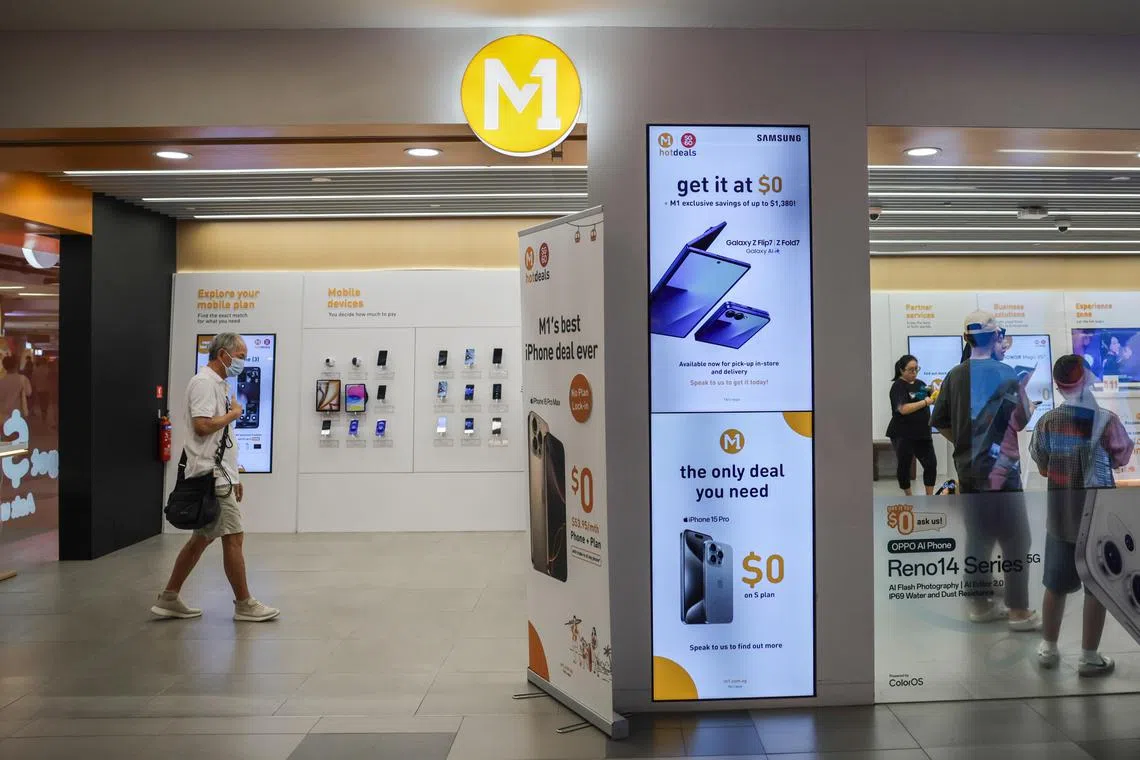Simba-M1 merger won’t immediately impact mobile plan prices: Analysts
Sign up now: Get ST's newsletters delivered to your inbox

Keppel announced on Aug 11 the sale of the telecom business of its subsidiary M1 to rival Simba Telecom for $1.43 billion.
ST PHOTO: GIN TAY
Follow topic:
SINGAPORE - Simba Telecom’s acquisition of rival M1 is expected to create a stronger competitor to Singtel and StarHub, but do not expect mobile plan prices to change as a result, said analysts.
A price war is unlikely to break out in the near term as current plans are already competitive, said Ms Carmen Lee, head of OCBC Investment Research.
On Aug 11, Singapore-based Keppel announced the sale of the telecoms business of its subsidiary M1
For instance, Simba’s SuperRoam10 plan
“In a typical merger, the initial period will entail a relook into understanding the combined entity and the potential synergies. We believe pricing strategy will not be an immediate consideration,” said Ms Lee.
Similarly, rivals are unlikely to undercut their prices to win over M1 customers even though it is easy for consumers to switch telcos.
Instead, rival telcos may try to poach these customers with tactics such as bundling mobile and fixed broadband services for a special offer, or through loyalty programmes, said Professor Lawrence Loh of NUS Business School’s department of strategy and policy.
The sale of M1 is subject to approval by the Infocomm Media Development Authority, and Keppel said it hopes to wrap up the deal in the next few months.
Analysts also said that the consolidation of four mobile network operators into three could reduce the pressure to compete on price.
Competition in the telco industry is expected to stabilise and subside over the longer term, said Maybank Singapore’s equity research analyst Hussaini Saifee. He added that it is unlikely that consumers will jump ship unless the network quality deteriorates after integration.
“On the consumer side, M1 reaches the mid to low ranges of the market, while Simba is geared towards the low end of the market,” said Mr Saifee.
“Arguably, they can try to penetrate the higher end of the market with network synergies. But we will have to see what their strategy is after the consolidation.”
Singtel commands half of the total number of mobile subscribers here, with 4.5 million customers, while StarHub and M1 each have about two million subscribers. Simba has more than one million mobile subscribers.
OCBC’s Ms Lee said that the merger of Simba and M1 would reduce duplication of services and provide cost synergies from more efficient use of network infrastructure. The combined entity would also be better placed to compete with Singtel and StarHub in the consumer and enterprise markets.
The merger might also generate greater technological investments that result in better quality service and innovative offerings for consumers, said Prof Loh.
Consumers, on the other hand, are hoping that prices remain affordable, and services reliable.
Mr Tang S.K., a business owner in his 50s, said he switched to M1 from StarHub on Aug 11 as he was attracted by M1’s affordable plans and customer service. He was not aware of the sale that was announced in the morning.
He hopes that service reliability would not suffer when Simba takes over the operations of M1. “Simba must continue to be reliable and... provide good deals,” said Mr Tang.
A retail assistant who wanted to be known only as Mrs Tara, 55, said: “If the acquisition goes through, I hope the prices will be lower than what it is now.”
She is currently paying $20 a month for an M1 plan which comes with 330GB of data. She heard that Simba’s plans are even cheaper.
Civil servant Danish Raman, 29, said that he hopes his connections would remain stable following the M1 sale.
“Although Simba is relatively cheaper than the standard telco, the network connection in certain places can be quite bad.”


